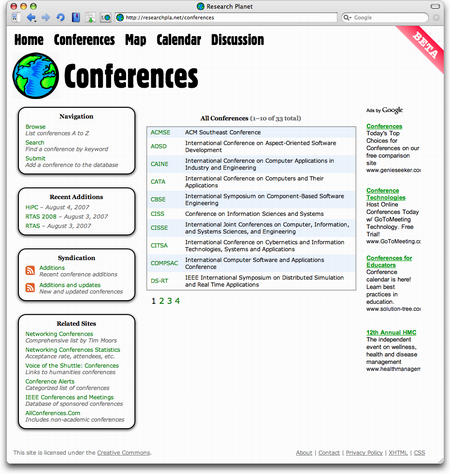As a new graduate student, one of the first things I learned was that the success of a researcher depends on the publish-or-perish model. It’s not a perfect system, but the pressure to generate publications of truly novel ideas does tend to motivate cutting-edge research. The peer-review process also provides valuable objective feedback for researchers, and it usually prevents low-quality work from being published. As a result, publication frequency has become—for better or for worse—the primary method of judging a researcher’s status and ability.
With the advent of the Internet, finding these publications has become a much simpler task. Spiders such as CiteSeer and Google Scholar, as well as publisher databases from IEEE and Springer, can find relevant publications with a simple keyword search. Some sites even offer vital statistics, such as the number of times a paper has been cited, to help judge the importance of the work. These tools are an enormous help when researching a topic.
But what happens when the research is done and it’s time to publish your own work? Surprisingly, finding a relevant conference or journal is often more difficult than finding a relevant publication. Searching the web can help, but you might overlook new or esoteric venues. For a more comprehensive search, professional organizations provide complete lists of the conferences they sponsor, but these too are limited. For instance, the ACM conference database doesn’t list IEEE events, while the IEEE database doesn’t list ACM events. And neither web site has any knowledge about conferences outside of their respective fields.
Making matters worse, some conferences have been accused of being “fake,” lacking any form of peer review and accepting all submissions (even randomly-generated papers) simply to make a profit. Journals, too, have been known to spam researchers with offers to publish in exchange for a fee. Given the key role that conferences and journals play in the integrity of research, these trends are disturbing.
After several years of dealing with these issues, always feeling a bit in the dark when it came to keeping track of research venues, I finally decided to do something about it: I created Research Planet, an independent, cross-discipline source of information about conferences and journals. Designed to make the life of a researcher easier, it offers:
- A searchable database of venues with filtering by acceptance rate, submission deadline, and other criteria
- A global, interactive map to help you locate upcoming conferences in your region of the world
- A calendar of events (available for importing into Apple iCal, Google Calendar, and other calendaring applications) so that you’ll never miss another submission deadline
- A forum for discussing conferences and journals
- Customizable web feeds to keep you informed of new venues and other updates to the Research Planet database
Over time, I’ll be adding additional features, such as user comments, a rating system, photo handling, and more. I also plan to import conference data from other organizations, making the Research Planet database more comprehensive. Together, these features will help you find the best place to publish your work.
